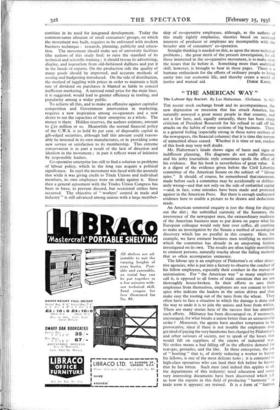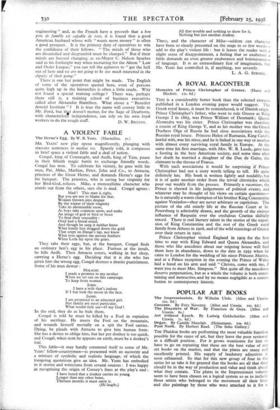" THE AMERICAN WAY "
The Labour Spy Racket. By Leo Huberman. (Gollancz. 7s. 6d.) THE recent stock exchange break and its accompaniment, the new depression or recession that has struck America, has naturally annoyed a great many people in that country, and not a few here, and, equally naturally, there has been sharp criticism of President Roosevelt for his refusal to call off his attacks on the habits of some sections of big business. There is a general feeling (especially strong in those naïve sections of the newspapers, the financial columns) that it is time this torrent of unmerited abuse ceased. Whether it is time or not, readers of this book may very well doubt.
Mr. Huberman's tirade shows signs of haste and signs of indifferent planning. His diagrams do not really illustrate and his jerky journalistic style sometimes spoils the effect of his evidence. But his book is nevertheless of great value. It is a digest of the evidence given before the Civil Liberties committee of the American Senate on the subject of " labour spies." It should, of course, be remembered that statements made before such a committee may be accidentally or deliber- ately wrong—and that not only on the side of embattled capital —and, in fact, some mistakes have been made and protested against in the American Press. But there is enough undisputed evidence here to enable a picture to be drawn and deductions made.
An American senatorial enquiry is just the thing for digging out the dirt'; the unbridled curiosity of the Senators, the irreverence of the newspaper men, the extraordinary readiness of the American business man to put down on paper what his European colleague would only hint over coffee, all combine to make an investigation by the Senate a method of sociological discovery which has no parallel in this country. Here, for example, we have eminent business men testifying to matters which the committee has already in an unsporting fashion investigated on its own. The results are often highly mortifying to eminent persons, naturally touchy about the failing memory that so often accompanies eminence.
The labour spy is an employee of Pinkerton's or other detec- tive agencies, who is put into a factory to observe the conduct of his fellow employees, especially their conduct in the matter of unionisation. For " the American way " as many employers call it, is opposed to all forms of trade unionism that are not thoroughly house-broken. In their efforts to save their employees from themselves, employers are not content to have spies who indicate the leaders in the union drives and thus make easy the rooting out of the tares from the wheat. They often have to face a situation in which the damage is done and the way to undo it is to join the unions and bore from within. There are many stories here of the success that has attended such efforts. Militancy has been discouraged or, if necessary, encouraged, for what breaks a union better than an unsuccessful strike ? Moreover, the agents have another temptation to be provocative, since if there is not trouble the employers may get tired of paying the very handsome fees charged by Pinkerton's and other saviours of society, not to speak of the losses that would fall on suppliers of the sinews of industrial war. No strikes means a bad falling off in the effective demand for tear-gas, grenades, and the like. In these enterprises, the job of " hooking " that is, of slowly seducing a worker to betray his fellows, is one of the most delicate tasks ; it is entrusted to high-class operatives who can land their fish before he knows that he has bitten. Such men (and indeed this applies to all the departments of this industry) need education and some very interesting documents have been discovered which tell us how the experts in this field of producing " harmony " (a trade term it appears) are trained. It is a form of " human engineering " and, as the French have a proverb that a bon Aire de famine est capable de tout, it is found that a good American husband whose wife " wants more money " is often a good prospect. It is the primary duty of operatives to win the confidence of their fellows. " The minds of those who are dissatisfied and disgruntled must be changed." But if their minds are beyond changing, as ex-Mayor C. Nelson Sparkes said in his forthright way when recruiting for the Akron " Law and Order League," you can tell the agitators to " get the hell out of here and we are not going to be too much interested in the dignity of their going."
There is one last point that might be made. The English of some of the operatives quoted here, even of persons quite high up in the hierarchys is often a little crude. Why not found a special training college ? There was, perhaps there still is, a training school of business executives called after Alexander Hamilton. What about a " Benedict Arnold Institute " ? It is true the name will convey little to Mr. Ford, but that doesn't matter, for the Sage of Dearborn, with characteristi independence, can rely on his own loyal

















































 Previous page
Previous page